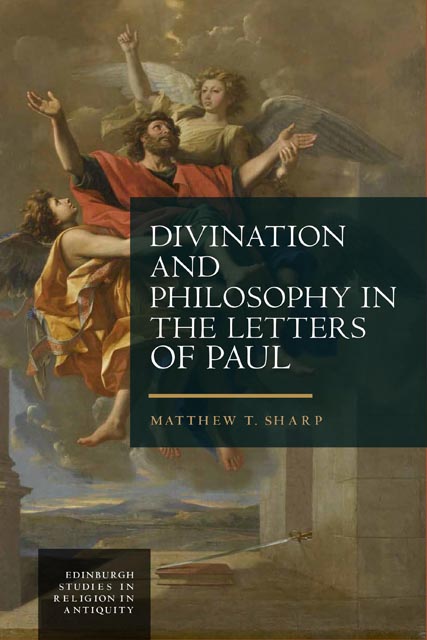2 - Visions
Published online by Cambridge University Press: 02 June 2023
Summary
In the last chapter, I discussed the three means of divine communication enumerated by Posidonius: the personal appearance of a god, the mediation of daimons, and the innate capacity of the soul. Of these, the most direct way that a god can communicate is by appearing in person to a human being, either in a dream or a waking vision. Paul claims to have received knowledge through such means on at least two specific occasions (Gal 1:11–12; 2 Cor 12:1–10), and displays a certain ambivalence about how these fit into the mechanics he works out elsewhere (2 Cor 12:2–3).
Scholarship is divided over how to view the place of visionary experiences in Paul’s life. Some fully embrace the image of Paul as mystic and visionary.A more common approach is to sharply distinguish Paul’s initial encounter with the risen Christ from any subsequent visionary experiences – the former being a pivotal moment of objective revelation and the latter being private and subjective spiritual experiences to which he attaches little importance.Among those who compare Paul’s claims to visionary experience with his broader Graeco-Roman environment, the tendency is to view Paul’s visions not as a method of divination – a means through which to acquire divine knowledge – but as a means through which to assert divine authority. Such experiences are important for his rhetoric, but less so for his thought and practice.
In this chapter, I will assess the nature and functions of Paul’s visionary experiences in comparison with the divinatory functions of dreams and visions in the Graeco-Roman world. Such visions did indeed play a pivotal role in establishing Paul’s authority as an apostle, but this is inextricably intertwined with their role as conveyors of divine knowledge, and they thus form an important part of Paul’s divinatory repertoire.
Dreams, Visions, and Experience: Preliminary Issues
The mode of divination in which “the gods in person converse with men” (Cicero, Div. 1.64) at first sight appears the most straightforward, but it presents particular challenges to historical analysis and classification. Before proceeding, two particular questions must be dealt with. First is how to distinguish and classify dreams, epiphanies, and waking visions in the context of divination. Second is how to treat the relation of dream and vision reports to actual experience.
Dreams
Dreams are a ubiquitous source of divine communication in ancient literature.
Information
- Type
- Chapter
- Information
- Divination and Philosophy in the Letters of Paul , pp. 62 - 96Publisher: Edinburgh University PressPrint publication year: 2023
